
Lower Chinese demand and CS crop revision
"China has been facing economic challenges including deflation and high financial leverage, exacerbated by the recent trade war escalation with the US, leading to a slowdown in sugar market demand. Brazilian crop prospects remain positive, though revised downward due to recent below-average precipitation. Re-running our model for TCH, it indicates yield reduction in the Center-South region, leading to a revised cane crushing forecast from 630 Mt to 621.2 Mt."
Lower Chinese demand and CS crop revision
- China faces economic challenges, including deflation and high financial leverage. The trade war with the US may worsen these issues.
- China did not take advantage of recent import arbitrage, indicating weaker demand. Both fundamentals and macroeconomic developments can be perceived as responsible for the lack of purchasing interest.
- Brazilian crop prospects are positive, but February and March’s lower-than-average precipitation shouldn’t be overlooked.
- The Vegetation Health Index (VHI) for cane areas from National Oceanic and Atmospheric Administration (NOAA) allows for optimism.
- Yield reduction in the Center-South region led to a revised cane crushing forecast from 630 Mt to 621.2 Mt and reduced sugar production from 43.3 Mt to 42.6 Mt.
China has been struggling with economic challenges, particularly in its real estate sector, for over a year. These challenges include deflation and high financial leverage, as the government has relied on fiscal stimulus to spur activity growth. The recent escalation of the trade war with the US could potentially exacerbate these issues and underscore a concerning trend for the sugar market: a slowdown in demand.
Image 1: China’s Estimated Import Arbitrage
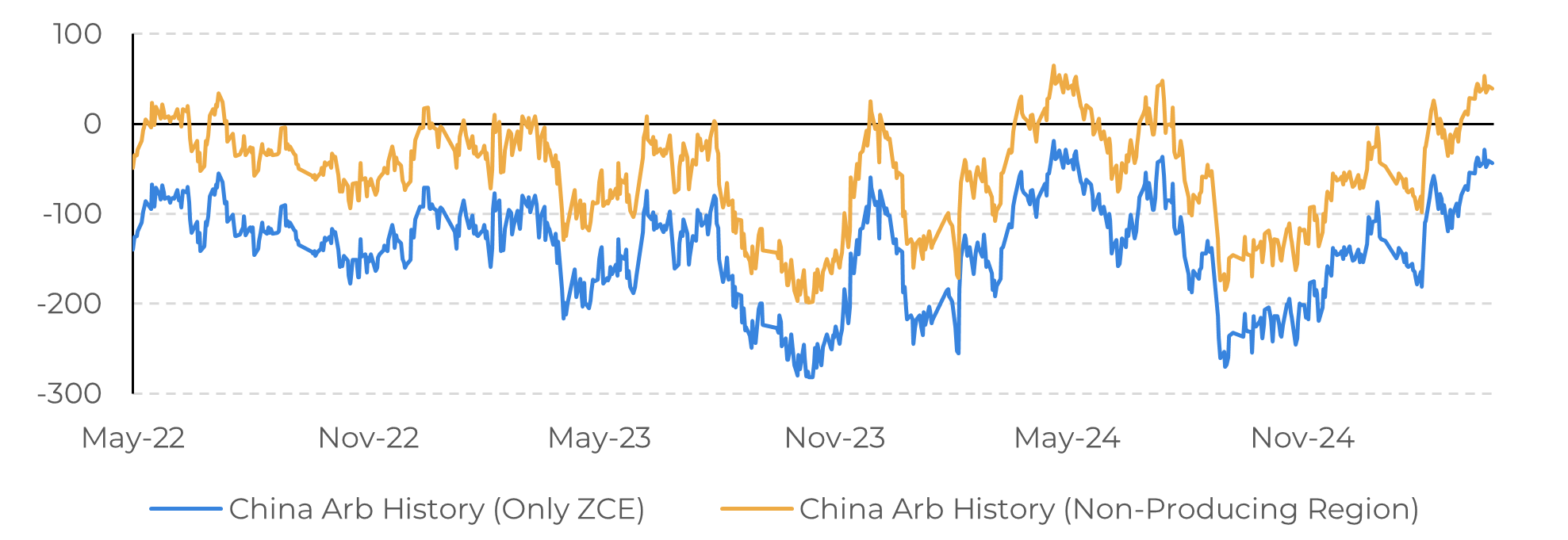
Source: Bloomberg, Refinitiv, Msweet, Yntw, Hedgepoint
Image 2: Brazilian Monthly Exports to China (‘000t)
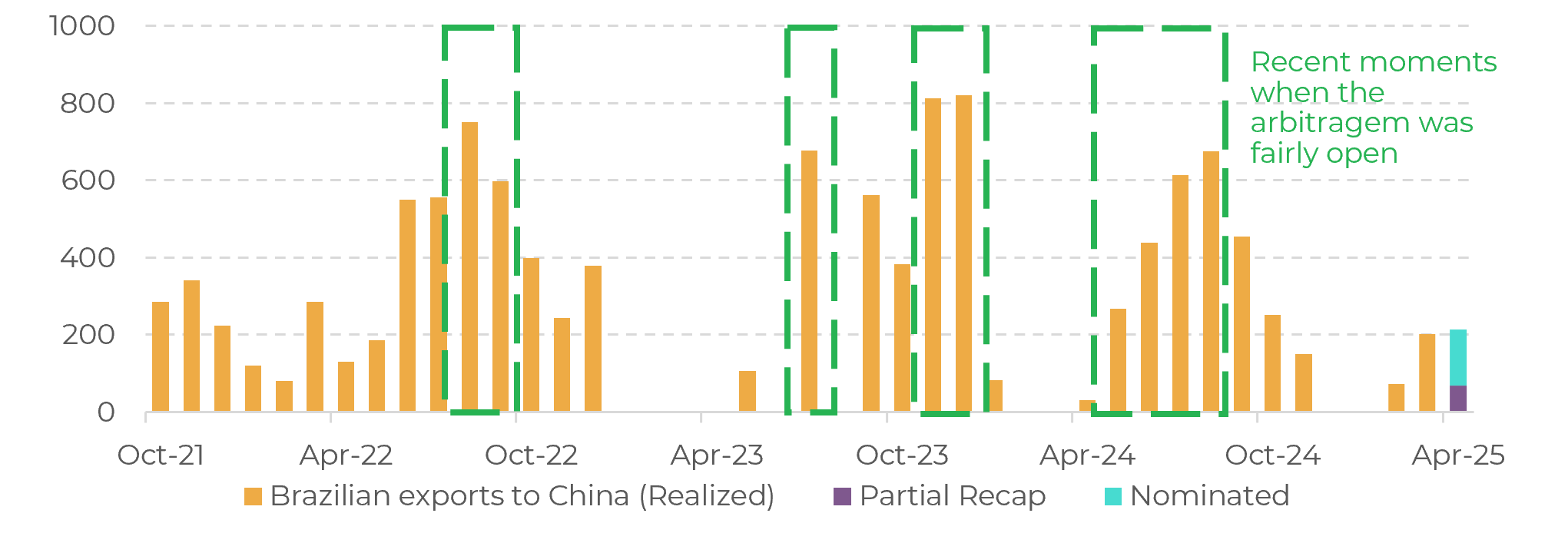
Source: Williams, Hedgepoint
Image 3: Weekly Vegetation Health Index for Center South Cane Areas
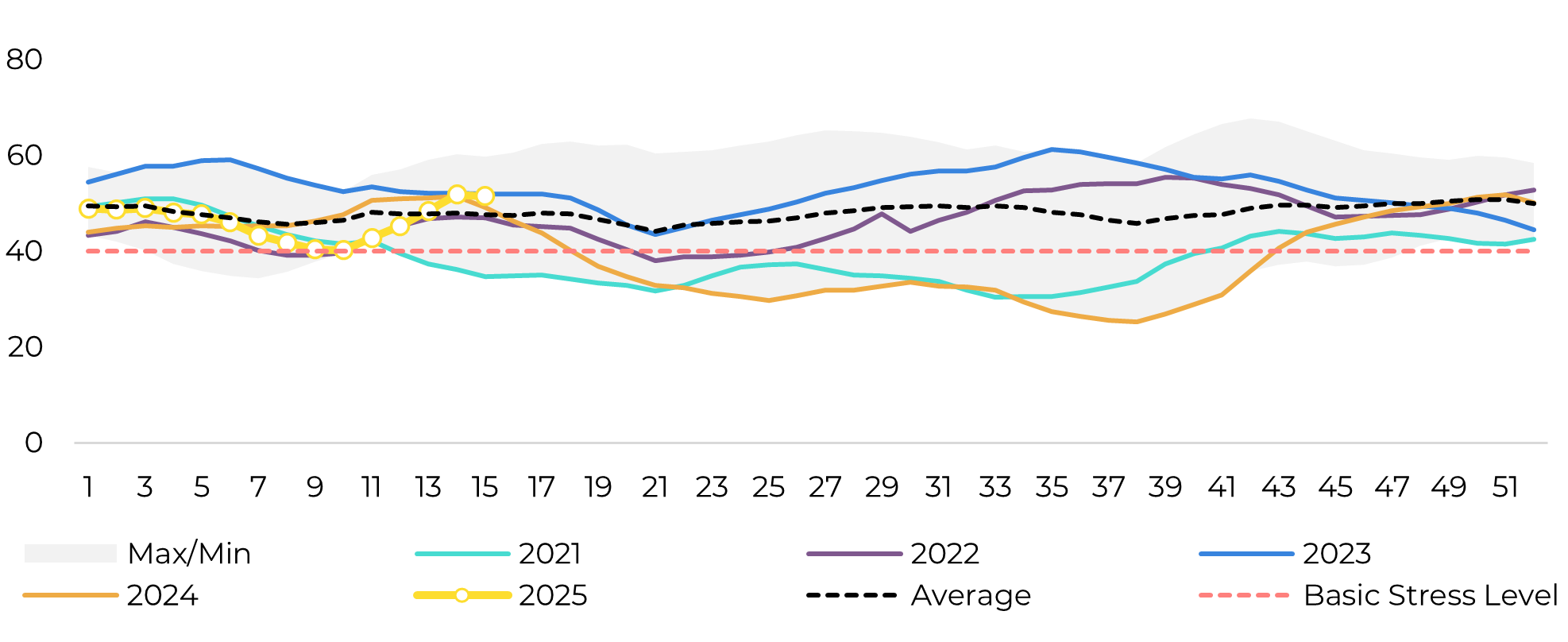
Source: NOAA, Hedgepoint
Image 4: Agricultural Yield and Area Evolution
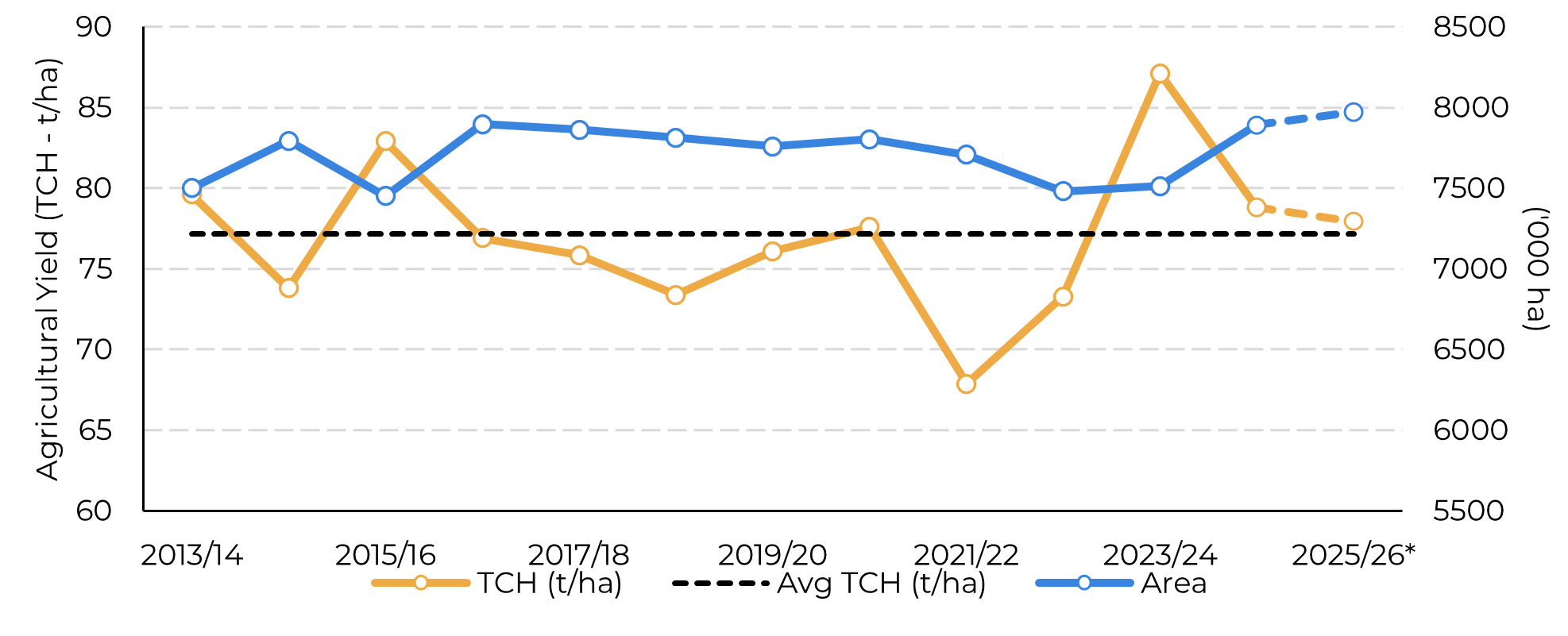
Source: Unica, Conab, Hedgepoint
Image 5: Crop estimates summary
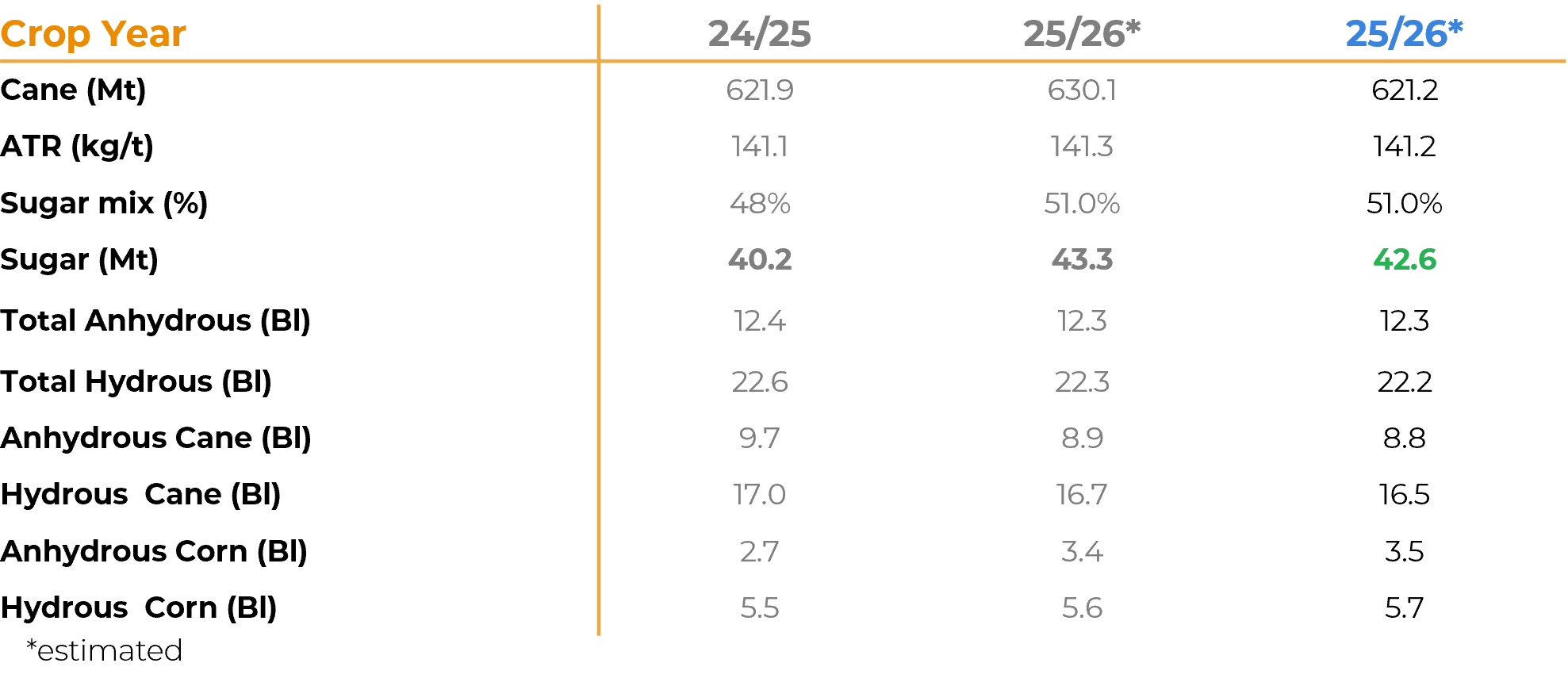
Source: Unica, Hedgepoint
In Summary
Weekly Report — Sugar
livea.coda@hedgepointglobal.com
laleska.moda@hedgepointglobal.com
Disclaimer
This document has been prepared by Hedgepoint Schweiz AG and its affiliates (“Hedgepoint”) solely for informational and instructional purposes, without intending to create obligations or commitments to third parties. It is not intended to promote or solicit an offer for the sale or purchase of any securities, commodities interests, or investment products. Hedgepoint and its associates expressly disclaim any liability for the use of the information contained herein that directly or indirectly results in any kind of damages. Information is obtained from sources which we believe to be reliable, but we do not warrant or guarantee the timeliness or accuracy of this information. The trading of commodities interests, such as futures, options, and swaps, involves substantial risk of loss and may not be suitable for all investors. You should carefully consider wither such trading is suitable for you in light of your financial condition. Past performance is not necessarily indicative of future results. Customers should rely on their own independent judgment and/or consult advisors before entering into any transactions. Hedgepoint does not provide legal, tax or accounting advice and you are responsible for seeking any such advice separately. Hedgepoint Schweiz AG is organized, incorporated, and existing under the laws of Switzerland, is filiated to ARIF, the Association Romande des Intermédiaires Financiers, which is a FINMA-authorized Self-Regulatory Organization. Hedgepoint Commodities LLC is organized, incorporated, and existing under the laws of the USA, and is authorized and regulated by the Commodity Futures Trading Commission (CFTC) and a member of the National Futures Association (NFA) to act as an Introducing Broker and Commodity Trading Advisor. HedgePoint Global Markets Limited is Regulated by the Dubai Financial Services Authority. The content is directed at Professional Clients and not Retail Clients. Hedgepoint Global Markets PTE. Ltd is organized, incorporated, and existing under the laws of Singapore, exempted from obtaining a financial services license as per the Second Schedule of the Securities and Futures (Licensing and Conduct of Business) Act, by the Monetary Authority of Singapore (MAS). Hedgepoint Global Markets DTVM Ltda. is authorized and regulated in Brazil by the Central Bank of Brazil (BCB) and the Brazilian Securities Commission (CVM). Hedgepoint Serviços Ltda. is organized, incorporated, and existing under the laws of Brazil. Hedgepoint Global Markets S.A. is organized, incorporated, and existing under the laws of Uruguay. In case of questions not resolved by the first instance of customer contact (client.services@Hedgepointglobal.com), please contact internal ombudsman channel (ombudsman@hedgepointglobal.com – global or ouvidoria@hedgepointglobal.com – Brazil only) or call 0800-8788408 (Brazil only). Integrity, ethics, and transparency are values that guide our culture. To further strengthen our practices, Hedgepoint has a whistleblower channel for employees and third-parties by e-mail ethicline@hedgepointglobal.com or forms Ethic Line – Hedgepoint Global Markets. “HedgePoint” and the “HedgePoint” logo are marks for the exclusive use of HedgePoint and/or its affiliates. Use or reproduction is prohibited, unless expressly authorized by HedgePoint. Furthermore, the use of any other marks in this document has been authorized for identification purposes only. It does not, therefore, imply any rights of HedgePoint in these marks or imply endorsement, association or seal by the owners of these marks with HedgePoint or its affiliates.

